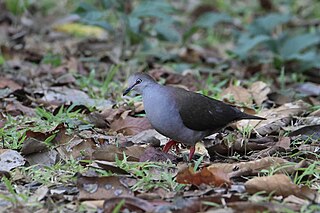
The northern rough-winged swallow is a small, migratory swallow. It is very similar to the southern rough-winged swallow, Stelgidopteryx ruficollis.

The rock wren is a small songbird of the wren family native to western North America, Mexico and Central America. It is the only species in the genus Salpinctes.

The least grebe, an aquatic bird, is the smallest member of the grebe family. It occurs in the New World from the southwestern United States and Mexico to Argentina, and also on Trinidad and Tobago, the Bahamas and the Greater Antilles.

The grey-headed dove (Leptotila plumbeiceps) is a large New World dove. It is found from eastern Mexico to Colombia.

The grey-chested dove is a species of bird in the family Columbidae. It is found in Belize, Colombia, Costa Rica, Guatemala, Honduras, Mexico, Nicaragua, and Panama.

The grey-breasted wood wren is a species of bird in the family Troglodytidae. It is found from Mexico to Bolivia.

The grey-throated leaftosser is a Near Threatened species of bird in the subfamily Sclerurinae, the leaftossers and miners, of the ovenbird family Furnariidae. It is found in Bolivia, Brazil, Colombia, Costa Rica, Ecuador, Panama, Peru, Trinidad and Tobago, and Venezuela.

The variegated squirrel is a tree squirrel in the genus Sciurus found in Costa Rica, El Salvador, Guatemala, Honduras, southern Mexico, Nicaragua, and Panama. Fifteen subspecies are recognised. It is a common squirrel and the International Union for Conservation of Nature has rated it a "least-concern species". Variegated squirrels kept as pets in Germany have been implicated in the transmission of a bornavirus to humans from which three people have died.

Josia gigantea is a moth of the family Notodontidae first described by Herbert Druce in 1885. It is found from southern Mexico to Colombia.

Disphragis is a genus of moths of the family Notodontidae erected by Jacob Hübner in 1820. The genus is confined to the New World and it contains about 137 species.

Hippia is a genus of moths of the family Notodontidae described by Heinrich Benno Möschler in 1878.

Pieriballia is a genus of butterflies in the family Pieridae erected by Alexander Barrett Klots in 1933. Its only species, Pieriballia viardi, the painted white or viardi white, was first described by Jean Baptiste Boisduval in 1836. It is found from Mexico to Bolivia and Paraguay. Strays can be found in southern Texas in the United States. The habitat consists of rainforests and transitional cloud forests.

Elasmia is a genus of moths of the family Notodontidae.

Elasmia packardii is a species of moth of the family Notodontidae. It occurs in Texas, Arizona, New Mexico, Oklahoma, Kansas and Mexico.

Elasmia cave is a species of moth of the family Notodontidae. It occurs in New Mexico, Texas and possibly Mexico. Adults are on wing from April to early October.
Chrysoglossa demades is a moth of the family Notodontidae first described by Herbert Druce in 1885. It is found in Panama, Costa Rica, Nicaragua and Mexico.
Dioptis butes is a moth of the family Notodontidae first described by Herbert Druce in 1885. It is found from Costa Rica north to Belize and Veracruz in Mexico.
Nystaleinae is a subfamily of the moth family Notodontidae. The subfamily was described by William Trowbridge Merrifield Forbes in 1948.

Nystalea indiana, commonly known as Grote's tropical prominent moth, is a species of prominent moth in the family Notodontidae. It was described by Augustus Radcliffe Grote in 1884 and is found in North America.
Dasylophia thyatiroides, the gray-patched prominent, is a species of prominent moth in the family Notodontidae. It was described by Francis Walker in 1862 and is found in North America.


















